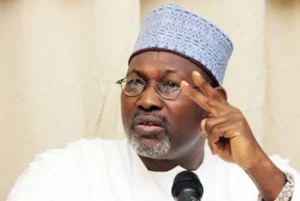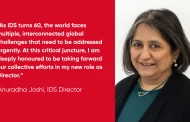The articulatory practice that will shape the contest for power in 2027 is obviously unfolding with the return of restructuring of Nigeria back on the agenda. It is coming from Bayero University, Kano political scientist, Prof Attahiru Jega, a former Chairman of the Independent National Electoral Commission (INEC) who is insisting it is crucial to do so ahead of the 2027 general elections.
Jega who spoke on “Safeguarding Nigeria’s Future: Prioritizing Citizen’s Welfare and Security Amidst Challenges” in a Convocation Lecture at the Bauchi State University last Friday is posing restructuring as medicine for what he calls tremendous, wide-ranging and verified challenges facing Nigeria and which he says could put the future of the country as well as of the citizens in jeopardy if not urgently and successfully addressed in good time.

Prof Jega
Said Jega “Anywhere in the continents of the world, in which a country of over 200 million is in jeopardy, the consequences would be wide-ranging and calamitous for the entire continent. Safeguarding Nigeria’s future, and by extension that of Africa, therefore, requires addressing these challenges and re-prioritizing the Nigerian state’s policies and strategies towards addressing the fundamental needs and aspirations of citizens, especially socioeconomic wellbeing and human security”
He sees something paradoxical in the challenges facing Nigeria said to be the largest economy in Africa, imbued with stupendous natural, mineral and agricultural resources, comparatively much more trained and intellectually endowed human capital, with one out of every four Africans being a Nigerian and one out of every five black people in the world being a Nigerian.
Toeing to his structuralist political economy training, Jega contends that the profound challenges currently bedeviling Nigeria could be said to be structural, systemic but also related to value orientation. “Structurally, we need to, among other things, address the challenges of how our federation is arranged and how it has evolved; how it has become distorted and centralized and how to deconcentrate power and resources from the federal center to the states and local governments”
He went on to say that Nigeria also needs to address how her national economy is structured and integrated into the global political economy, with greater benefits to former colonial masters than to Nigeria and its citizens. “The systemic challenges are related to our system of government, its composition and decomposition, its costs, institutional inefficiency and decay, as well as the bad governance the institutions and elected public officials deliver, through elite capture and self-serving control of, especially, the electoral process”, added Jega.
On value-orientation, Jega makes the case for addressing and reversing the mindsets of both the elites, especially the so-called political class, and even the masses, especially the electorate, from destructive engagement, to a more constructive involvement, with the electoral process. He justifies this in the desirability of ensuring electoral integrity in bringing about what he calls “respectable, responsible and responsive representatives of the people into the executive and legislative arms of government; responsible people who would address the needs and aspirations of citizens who elected them through good governance, rather than merely focusing upon their personal aggrandizement”
The combined effects of the challenges he identified have, in his view, resulted in contested legitimacy of the state, bad governance, stunted economic growth and development, increased inequality and poverty amongst citizens, acute failure of the state to provide for welfare and security of not just the privileged few but all citizens. He says that the challenges have also resulted in popular dissatisfaction with electoral democracy and representative governance, given their perceived failure to satisfy popular needs and aspirations. To these he traces observable massive withdrawal of citizens from political participation in the governance processes, especially in elections, “unless if there is massive corrupt, monetary, inducements”
It is his contention that Nigerians have, for long, aspired for representative democracy for socioeconomic development and have struggled for it. What he can see is the frustration of their aspiration and struggles by the ruling and governing classes, to the extent that for many citizens, despondency has set in and the effort now seems almost futile. “The ruling and governing classes have refused to confer all the rights and privileges, which citizenship ordinarily confers to Nigerians. Rather, they have manipulated primordial identities to subvert the essence and content of citizenship, and have, for example, significantly elevated so-called “indigene rights” and other primordial identities, which are no more than spurious unjustified privileges, over and above citizenship rights, with dire negative consequences on national cohesion, stability and socio-economic development of Nigeria”.
Referencing a previous statement of his, Jega notes that the struggle to acquire, protect and defend citizenship rights is linked to the general struggles for expansion of democratic space, for protection and defense of fundamental rights, for the right to live in peace and securely, and earn a living in any part of Nigeria, and for good, democratic governance, which would ensure justice and equity as well as purposefully address the fundamental needs and aspirations of the majority of the ordinary Nigerians.
In his view, the discourse on the citizens’ welfare and security in contemporary Nigeria needs to center on how the Nigerian state, currently under the liberal democratic framework, can discharge its responsibilities and obligations to its citizens through coherent, focused, people-oriented redistributive policies, which are targeted towards addressing the needs and aspirations of the generality of the citizens, devoid of exclusion, partiality, and abnegation of equality of opportunities for all citizens.

Frightening for Nigeria
Unfortunately, Intervention does not have the technology to paste the graphic indicators in the 2023 Nigeria’s Ranking and Scores in Global Indices Jega use used to demonstrate the enormity of the challenges. But the indicators stretch across the following 29 issue areas:
Corruption Perception Index (CPI), Censorship Index, Political Indicator Index, Economic Indicator Index, Legislative Indicator Index, Social Indicator Index, Ease of Doing Business Index, Democracy Index, Fragile State Index, Human Freedom Index, Gender Gap Index, Human Freedom Index, MO Ibrahim Index of African Governance, Organised Crime Index, Perception of Electoral Integrity, Multidimensional Poverty Index (MPI), Quality of Life Index, Religious Freedom Index, Insecurity/Global Peace Index, Global Hunger Index, Human Development Index, Security and Rule of Law Index in Africa, Economic Opportunity Index in Africa, Human Development Index in Africa, Participation Right and Inclusion Index, Health and Survival Index, Political Empowerment Index, Economic Opportunity and Participation Index and, lastly, Global Ranking for Educational Index.
Nigeria’s scores out of 180 countries are, in most cases, alarming, reaching 98 percent in state fragility, for example.
It is the context of the foregone that he situates his case for restructuring, the rest of that being in his own words:
- That before 2027, some form of restructuring of the Nigerian federation should be embarked upon through evidence-based constitutional reforms, the objectives of which should be to deconcentrate powers and resources from the federal tier and to spread them to those of the state and local governments. In doing this, best practices could be learnt from model federations, such as India, Canada and the USA in the areas of revenue generation and sharing and adapted to our local context and circumstances
- No additional states and LGAs should be created. The additional resources current states would get from the de-concentration of power and resources as recommended above would make all the 37 states and FCT financially viable and facilitative of grassroots development
- The cost of governance at both the federal, state and local tiers of governance need to be drastically cut, and measures introduced to entrench transparency and accountability and effective anti-corruption oversight
With regards to the structure of the Nigerian economy, the following recommendations are offered:
- Serious reform measures need to be introduced to diversify Nigeria’s earnings from dependence of export of crude oil, to expand investment in agricultural production and Agro-allied processing both for the home market and for export; and revive, expand and reposition our industries and manufacturing enterprises, for production, both for the home-market and for export
- Conceive of and pursue economic growth and people-oriented development strategies, independent of the influence of IMF and the World Bank, relying on implementable development plans, which are realistically implementable within a delineated time-frame
- Reform the country’s fiscal and monetary policies to strengthen our productive enterprises, human capital and currency
- Conceive of and implement employment generation as well as entrepreneurship development strategies to help constructively address the challenges of the youth bulge in Nigeria
- Nigeria should become more actively involved in south-south cooperation and development initiatives, in particular, in the BRICS+
With regards to addressing systemic and governance challenges, it is recommended as follows:
- Amend the Electoral Act 2022, so as to remarkably improve upon the legal framework for future elections with integrity. In particular pay attention to reforming the role of political parties in the leadership recruitment and candidate selection processes at all levels and tiers of governance.
- Pursue reforms to improve and protect the integrity of the judiciary, as well as find a way of insulating them from the corruptive politics of electoral dispute resolution through litigation
- Improve the process of appointment into INEC with a view to protecting it from capture by crooked politicians and partisan pressures and influences
- Strengthen and expand the scope of the work of anti-corruption agencies and institutions to mitigate the damaging impact of corruption in the Nigerian political economy
- Institute and initiate reform measures that would ensure not only substantial reduction in the cost of governance at all levels, but also effective and transparent preparation, monitoring and implementation of budgets, as well as policies and projects
With regards to states’ role in safeguarding the security and welfare needs of the citizens, it is recommended as follows:
- The Constitution should be amended to explicitly recognize the equal rights of all citizens, irrespective of their ethnic status or affiliation, and regardless of whether they are perceived as ‘indigenes’ or ‘settlers’. Citizenship rights should, and must, triumph over any other particularistic, primordial rights.
- The citizens in general, need to understand their rights, duties and obligations as citizens, they need to enhance their active participation in all aspects of societal development, and they need to contribute effectively to peace-building and good governance for sustainable socioeconomic development in Nigeria.
- There is the need for greater citizens’ awareness, nurtured through civic and political education not only by the government, but through involvement of civil society and community-based organisations.
- There is the need for transparency and accountability of government and respect for the rule of law. These are conditions for the creation and perpetuation of social trust, cooperation and active participation of citizens in the development of their country.
- There is the need for continual, far-reaching reforms on the citizens’ welfare provisioning at all levels of government, so as to advance, protect, a Having noted the role of the state to pay attention to citizens’ welfare in a democratizing country like Nigeria, it is recommended that defend, their human security and dignity
- There is the need for a comprehensive review and reform of the security architecture in Nigeria, with targeted priority on policing reforms and repositioning, in terms of recruitment, training, motivating and equipping them for internal maintenance of law and order; a focus on training and retraining of the armed forces for their core role of protection and defense of the territorial integrity of the country and assisting the police in internal security only when the police are overwhelmed, and armed forces are formally called upon to provide support; and general training and retraining of all the security forces and agencies, with regards to intelligence sharing and joint security operations, with carefully defined roles for each security sector/agency.
- Ultimately, the approach to security provisioning in Nigeria needs to be predicated on a broader and more holistic definition of security, which is human security in all of its significant components, rather than just physical protection of lives and property, which seems to be the prevailing but narrow definition of security provisioning by the Nigerian state.
The section on restructuring is bound to make the headlines in the Nigerian mediaspace but restructuring is just one aspect of the massive lecture of over 8000 words. Intervention is, for instance, interested in the “Structure of the Nigerian Economy” component of the lecture which set the ground for the restructuring argument. That section below is also presented in Jega’s own words as follows:
Just like the structure of the Nigerian federation, the structure of the Nigerian economy has a colonial origin, primary designed to meet up with, and satisfy, the economic interests of the colonial powers. Long after colonial rule has ended, the structure has embedded and integrated the Nigerian economy into the global capitalist system, such that it continues to promote primary commodity production, and export primarily to Europe, and import of finished products from all parts of the world, rather than commodity production through industrial production and manufacturing for both the home market and export.
Although there has been a slight move away from primarily agricultural commodity production and export, that only resulted in a virtual total dependence on the production and exportation of crude oil for foreign exchange revenues and earnings, such that any fluctuation in the price of crude oil, or exchange rate of the US dollar, the dominant currency of exchange, invariably affects Nigeria’s fortunes and its development processes. As may studies by scholars and analysts have shown, the so-called oil wealth of Nigeria has been squandered, mismanaged, not appropriately invested to nourish other sectors of the economy, and has nurtured and entrenched one of the most corrupt public and private sectors in the world.
The Nigerian monoculture economy, reliant and dependent on production of crude oil for exports, has for long been in perpetual crises, underperforming far below its touted potentials, and negatively affecting economic growth and development in the country. The industrial/manufacturing sector has virtually collapsed, unemployment rate is quite high, especially among the youth, exchange rate of the naira is weak, inflation is very high, poverty incidence relatively high and income inequality is almost exponentially widening. Statistics and data from reputable international organizations and institutions attest to all these disturbing challenges associated with the structure of the Nigerian economy and its persistent crises. Therefore, any serious effort/reform measures to safeguard the future of the country must necessarily involve an appropriate restructuring and repositioning of the economy to serve Nigeria’s genuine, people-oriented, socioeconomic and development aspirations”
Neither restructuring nor Jega’s take on it as a topic in Nigerian politics is new. What is new in his return to the topic might be the 2027 context. The key questions remain the issue of who will carry out the restructuring in the absence of elite consensus on what it refers to as well as the absence of irresistible coalitions that can provide the hegemonic framing of the concept and its institutions and practices. Obviously, the ruling party and the existing parties have notions of restructuring and there is no common ground among them as to hope for implementation. It is even not clear if Obasanjo, Buhari, Tinubu, Atiku, Gen Danjuma and even the Left or any other of the major players have a same sense of restructuring. While that may not be where the problem is, the question of which fraction of the power elite has articulatory advantage in an organisational sense is in doubt.
Is it possible that Jega knows something the rest of us do not know about an impending Archimedean coalition that can act as an irresistible lever of a party that can handle restructuring beyond the scatter brain framing of it in most of the existing parties? Only in that context might the third key problem with restructuring no longer arise.
That other question which has always bedevilled restructuring is the fear about handing over excessive powers to the local champions who rule the states as emperors. Jega did not cover that in his lecture.
Jega’s lecture could trigger another round of debate on the concept. If it happens, Nigeria will be the richer for it. Right now, it could be said that culture of debates is dead in the giant of Africa!




























